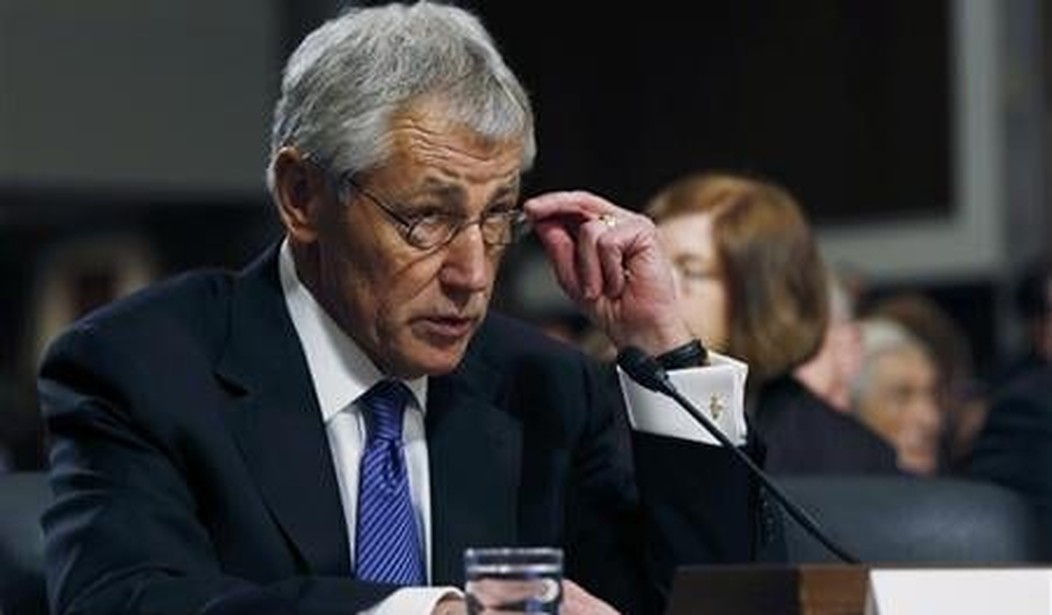At 7:30 a.m. Wednesday morning, former Sen. Chuck Hagel will arrive at the River Entrance of the Pentagon for the first day of his new job.
He’ll take the oath of office behind closed doors at 8:15 a.m. Later in the morning, in the Pentagon auditorium, the Vietnam vet will address service members and civilian staff weathering a change in command while anxious about their own livelihoods.
It’s no secret that outgoing Defense Secretary Leon Panetta was frustrated by the delay in Hagel’s confirmation and is eager to book it out of town and back to his Monterey Bay walnut farm. But Panetta was also viewed on both sides of the aisle as a stable leader for the department through the budgetary threats, warning of the effect that deep sequestration cuts will have on readiness and national security.
Panetta, who was confirmed unanimously by the Senate in 2011, was also not as politically divisive as his successor. Hagel’s 58-41 confirmation today was the narrowest margin since the position of Defense secretary was created in 1947.
“My prayer as I leave is that we all share the same courage and dedication to protecting the United States of America, the home of the free and the land of the brave,” Panetta said in a farewell memo to employees today. “God bless America, God bless you, and God bless the men and women of the Department of Defense.”
While Panetta’s note talked of service members responding “to the call of the bugle with courage and with selfless dedication to country,” President Obama was sounding the bugle of victory in getting his nominee through.
“I will be counting on Chuck’s judgment and counsel as we end the war in Afghanistan, bring our troops home, stay ready to meet the threats of our time and keep our military the finest fighting force in the world,” Obama said in a statement. “Most of all, I am grateful to Chuck for reminding us that when it comes to our national defense, we are not Democrats or Republicans, we are Americans, and our greatest responsibility is the security of the American people.”
The president lauded the “bipartisan confirmation” of Hagel, though just four Republicans voted for the Nebraska Republican — Sens. Thad Cochran (R-Miss.), Mike Johanns (R-Neb.), Richard Shelby (R-Ala.) and the surprise of the day, Sen. Rand Paul (R-Ky.). Johanns announced last week that he won’t be running for re-election.
Today’s confirmation conveniently coincided with Obama’s trip to a shipbuilding facility in Newport News, Va., to give another speech on the sequester.
Even in this defense-saturated region, he amazingly barely touched on the more than $500 billion in defense cuts required by the sequester.
“Over at the Norfolk naval station, the threat of these cuts has forced the Navy to cancel the deployment or delay the repair of certain aircraft carriers. One that’s currently being built might not get finished. Another carrier might not get started at all and that hurts your bottom line. That hurts this community,” Obama said, then steering the speech toward domestic program cuts.
“If the sequester goes into effect, more than 2,000 college students would lose their financial aid. Early education like Head Start and Early Start would be eliminated for nearly a thousand children, and around 18,000 fewer Virginians would get the skills and training they need to find a job,” he said. “Across the countries these cuts will force federal prosecutors to potentially let criminals go. Air traffic controllers and airport security will see cutbacks, and that could cause delays at airports across the country. Tens of thousands of parents will have to scramble to find child care for their kids. Hundreds of thousands of Americans will lose access to primary care and preventive care like flu vaccinations and cancer screenings, including more than 3,500 children right here in Virginia.”
GOP Rep. Scott Rigell (Va.) joined Obama on Air Force One today, along with Rep. Bobby Scott (D-Va.). While the White House touted Rigell’s presence as a harbinger of bipartisan cooperation to reach a sequester deal palatable to the president,
Rigell said he requested the meeting with Obama to press the need to stop deep defense cuts.
“I shared with the president my concern that the administration has not provided a definitive legislative alternative to sequestration,” Rigell said. “Though the conversation was substantive, my concern on these critical topics remains.”
However, the congressman said the Republican Conference position that no tax hikes will be considered in a sequestration aversion deal is “equally concerning.”
“Given the two positions, sequestration, an alternative described by both Republicans and Democrats as reckless, now seems inevitable,” Rigell continued. “As a result, hard working Americans, including many who call Hampton Roads home, will suffer. National security will suffer as well. Given the severity of the consequences, this is unacceptable. I continue to call on the president and leadership from both parties to put what is best for our country ahead of all else.”
But with sequestration set to take effect Friday, Obama’s schedule tomorrow starts with meetings with senior advisers — including Hagel — followed by the unveiling of the Rosa Parks statue at the Capitol and evening remarks at the Business Council dinner in Washington.
“Right now the Army has almost 60,000 people deployed in Afghanistan and another 22,000 deployed in other places within the Middle East, Kosovo and other places, and more than 91,000 soldiers foreign-stationed across the globe,” Army Chief of Staff Gen. Ray Odierno told a House Appropriations defense subcommittee today.
“It is these very soldiers who will suffer the most under these budgetary cuts. We simply do not know when we’ll be asked to deploy soldiers to fight again, but history is very clear on this subject: We will ask them to deploy.”
Odierno said the combination of sequestration, the continuing resolution and a shortfall in overseas contingency operations funds for Afghanistan has led to an $18 billion shortfall for his branch’s operation and maintenance accounts this year alone, in addition to $6 billion cut from support programs.
“We will curtail training for 80 percent of our ground forces. This will impact a unit’s basic war-fighting skills, induce shortfalls across critical specialties, including aviation, intelligence, engineering, and even our ability to recruit new soldiers into the army,” he said.
Adm. Jonathan Greenert, chief of Naval Operations, warned that the cuts would have an “irreversible and debilitating impact” on the Navy.
“We will have inadequate surge capacity at the appropriate readiness level where it matters, and when it matters,” he told the committee.
Marine Corps Commandant Gen. James Amos noted that the five service chiefs at the witness table collectively represent more than 180 years of military service.
“Speaking today principally as a member of the Joint Chiefs of Staff, sequestration, by its magnitude, its timing, and its methodology will have a devastating impact on our nation’s readiness, both short term and long term,” Amos warned. “…First, risk to our national strategy. Second, risk to our forces. Third, risk to our people. And lastly, risk to the United States of America.”
“A fiscally driven lapse in American leadership in foreign engagement will create a void in which old threats will be left unaddressed, and new security challenges will, no doubt, find room to grow.”
Pentagon press secretary George Little opened today’s briefing by addressing “one of the narratives” he’d seen about sequestration.
“There seems to be a belief in some quarters that when it comes to negative impact that sequester will have on our national defense and military readiness, the Department of Defense is crying wolf. Nothing could be further from the truth,” Little said. “What you’ve heard from DoD leaders over the past few weeks is not hype. It’s the blunt truth. It isn’t exaggeration. It’s a clear-eyed assessment of what would happen to the department.”
Obama has vowed to exempt military personnel funding from sequestration, but soldiers will actually not be protected. By law, sequestration applies to all of the Defense Department budget, including wartime spending — so units won’t have the funds to back up operations.
“Across DoD, we will be short more than 20 percent of total requirements for operating funds, and the percentage will be closer to 40 percent for the United States Army,” Little said.









Join the conversation as a VIP Member